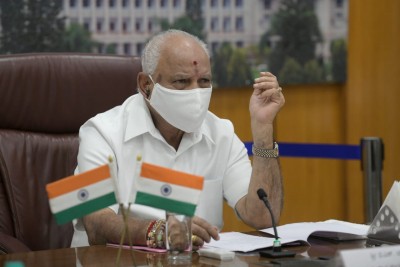
Bengaluru, Amidst continued speculations about leadership change in the state, the Karnataka cabinet, chaired by Chief Minister B.S. Yediyurappa on Thursday gave its nod to install a statue of 12th century social reformer Jagajyoti Basaveshwara on the premises of Vidhana Soudha.
The seat of the state legislature and secretariat, the Vidhana Soudha so far only had statues of famous politicians. There is a statue of Basaveshwara, also known as Basavanna and the founder of the Lingayat tradition (to which Yediyurappa belongs) nearby, but it is outside the premises.
After the cabinet meeting here, Law and Parliamentary Affairs Minister, Basavaraj Bommai said that the design of the statue would soon be finalised by the Kannada and Culture Department. "There are many statues of Basavanna, who is on a horse, but this time, the cabinet was unanimous to have a statue of Basavanna in a writing posture... but no posture is finalised yet," he said.
This cabinet decision assumes significance in the wake of repeated news being spread about Yediyurappa's replacement in the state by his own partymen.
Yediyurappa is seen as the tallest Lingayat leader in the state. In this last seven months, he has announced two major projects - the Anubhava Mantapa project -- also linked to Basaveshwara -- in Basavakalyana, in Bidar on January 7 and now, installation of Basaveshwara's statue inside precinct of Vidhana Soudha, which only cements his position as leader within his Lingayat community.
A statesman, philosopher, poet, social reformer and Lingayat saint in the Shiva Bhakti movement during the reign of the Kalyani Chalukya/Kalachuri dynasty, Basaveshwara was active during both dynasties but reached the peak of his influence during the rule of King Bijjala II of the latter.
Rejecting gender or social discrimination, superstitions and rituals, he sought to spread social awareness through his poetry, popularly known as 'Vachanaas', three to five line couplets in simple Kannada and ending with one or the other local names under which Shiva is invoked or offered prayers. In style, they are epigrammatical, parallelistic and allusive, and well on the vanity of riches, the valuelessness of mere rites or book learning, the uncertainty of life and the spiritual privileges of Shiva Bhakts.
As a statesman, he introduced new institutions such as the Anubhava Mantapa (the hall of spiritual experience), which is often quoted by Prime Minister Narendra Modi during his speeches.


.jpeg)

